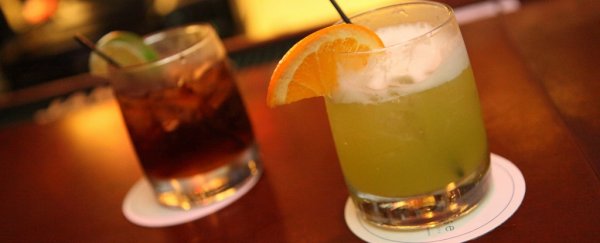A leading medical researcher has looked over the research and concluded that drinking alcohol – even in small amounts – doesn't just cause liver cancer, but can also lead to six other types of cancer.
According to Jennie Connor, from the University of Otago in New Zealand, the evidence suggests that booze causes cancer of the mouth and throat, larynx, oesophagus, liver, colon, bowel, and breast.
The research still isn't clear about how or why alcohol causes the mutations needed for cancer to form, but Connor says the findings indicate more than a casual association.
"There is strong evidence that alcohol causes cancer at seven sites in the body and probably others," said Connor.
"Even without complete knowledge of biological mechanisms, the epidemiological evidence can support the judgment that alcohol causes cancer of the oropharynx, larynx, oesophagus, liver, colon, rectum and breast."
To come to this conclusion, Connor analysed many of the major alcohol-based cancer studies from the last decade to pull all of the data together and examine the links between them.
In the end, she concluded that alcohol has a dose-response relationship to cancer formation, meaning that the more a person drinks, the more likely they will be to develop certain cancers.
"The highest risks are associated with the heaviest drinking, but a considerable burden is experienced by drinkers with low to moderate consumption, due to the distribution of drinking in the population," Connor told Denis Campbell from The Guardian.
The strongest of these links was between drinking and mouth cancer. According to Connor, drinking 50 grams of alcohol per day can increase a person's risks of mouth cancer up to seven times that of a non-drinker.
To put that into perspective because 'grams of alcohol' isn't really the best unit to understand, the National Institute on Alcohol Abuse and Alcoholism says that an average drink – something like a run-of-the-mill beer or a normal wine – has roughly 14 grams of alcohol in them.
Which means to get to that risk factor, a person would have to drink four drinks per day, though Connor says that even drinking less still raises the risk.
According to health officials in the UK, no level of regular alcohol consumption is safe.
In fact, back in January – long before the current study was published, the UK changed their drinking recommendations for men from 21 units (grams) per week to 14 units, making them the same level as their previous recommendation for women.
They also publicly stated that women who drink five units per day are 40 percent more likely to develop breast cancer than non-drinkers, reports The Telegraph.
To be clear, this research isn't in itself new, and it's only the conclusion of one scientists. But other researchers are also in agreeance with Connor, too.
For example, Susannah Brown, the science program manager for the World Cancer Fund, told New Scientist:
"We see the risk increasing as the amount of alcohol consumed increases, and we agree that there is solid evidence to conclude that alcohol consumption directly causes cancer."
"For cancer prevention, we have long recommended that people should not drink alcohol at all, but we understand that this can be easier said than done."
Despite these results, no one truly understands why the link between cancer and alcohol exists.
One of the popular hypotheses is that alcohol might damage DNA, leading to mutations that cause cancer cells to form, but until further research is done, no one really knows.
While these new findings will certainly put a downer on our next happy hour foray, it's important to note that without knowing the true cause as to why alcohol causes cancer – and seeing it happen firsthand – it's really hard to come up with proper recommendations.
For example, coffee was long thought to be carcinogenic, but a recent review by researchers at the World Health Organisation (WHO) found that the real cause of cancer was extremely hot beverages that burn a drinker's throat, leading to mutations in cell growth.
Though coffee and alcohol are completely different beverages on many levels, the June study shows how new knowledge can really sway findings.
Until that happens we have to accept that one of the oldest beverages in existence – one that might have even sparked the agricultural revolution – might be negatively impacting our health in very serious ways.
The commentary was recently published in the journal Addiction.
Update 26 July 2016: In an earlier version of the story we incorrectly stated that Connor's article was a meta-analysis, which is incorrect - it's just personal commentary. This has been updated.
